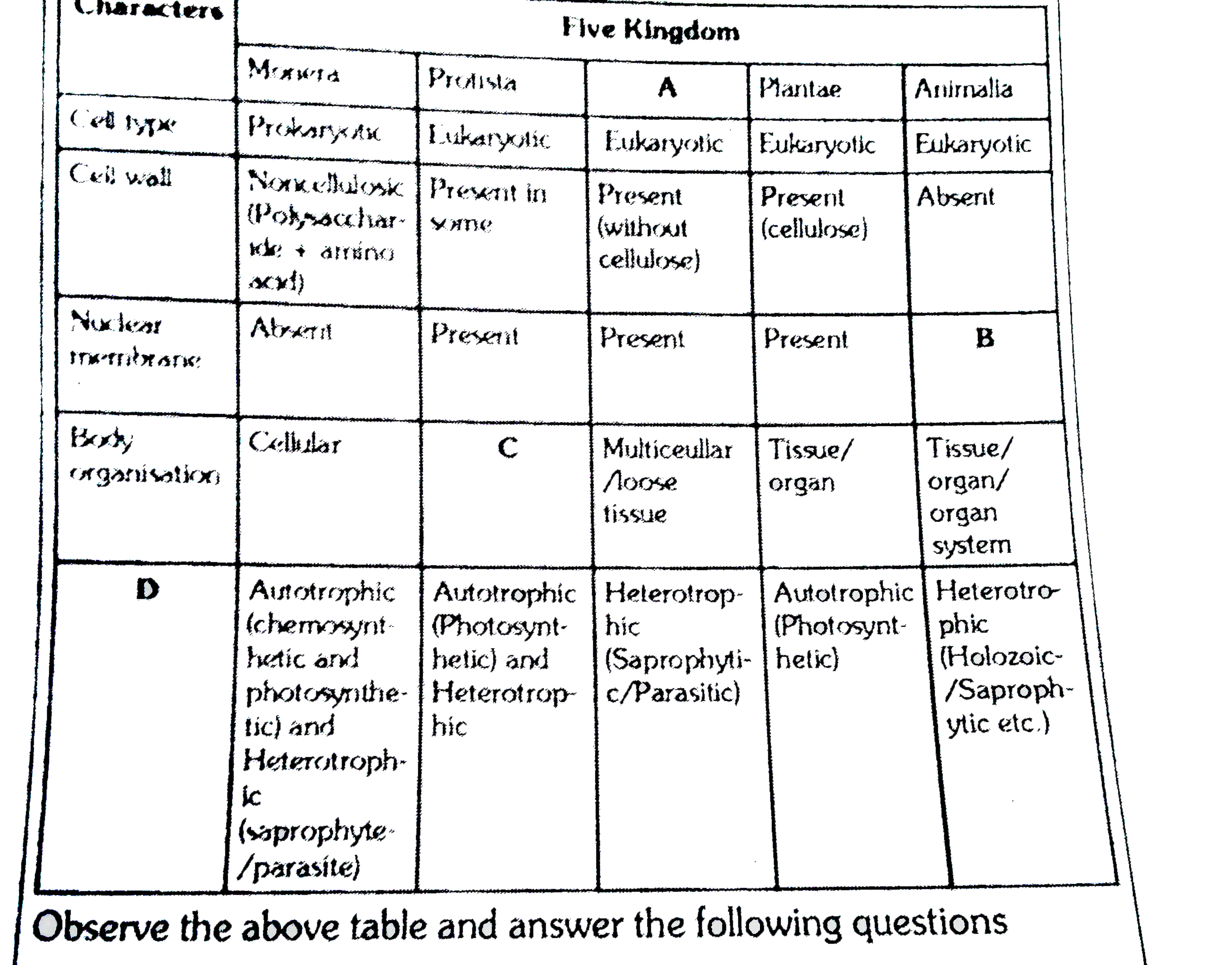Which kingdom is characterized by heterotrophic, eukaryotic organisms that are multicellular and their cells lack cell wall?
The correct Answer is:Kingdom-Animalia
To answer the question, "Which kingdom is characterized by heterotrophic, eukaryotic organisms that are multicellular and their cells lack a cell wall?", we can follow these steps:
1. Identify the Characteristics:
- The organisms are heterotrophic: This means they cannot produce their own food and must obtain it from other sources.
- They are eukaryotic: This indicates that their cells have a well-defined nucleus and organelles.
- They are multicellular: This means they are composed of more than one cell.
- Their cells lack a cell wall: This characteristic helps differentiate them from plant cells, which do have cell walls.
2. Analyze the Characteristics:
- Since the organisms are heterotrophic, they cannot belong to the plant kingdom, as plants are primarily autotrophic (they produce their own food through photosynthesis).
- The presence of eukaryotic cells indicates that these organisms belong to a kingdom that includes complex cells with nuclei.
3. Consider the Types of Organisms:
- The multicellular aspect suggests that we are looking at a kingdom that includes organisms made up of many cells, as opposed to unicellular organisms like bacteria or some protists.
- The lack of a cell wall further narrows down the options, as this is a defining feature of animal cells.
4. Conclusion:
- Given all these characteristics, the only kingdom that fits all these criteria is the Animal Kingdom. Animals are multicellular, eukaryotic, heterotrophic organisms that do not have cell walls.
Final Answer:
The kingdom characterized by heterotrophic, eukaryotic organisms that are multicellular and lack cell walls is the Animal Kingdom.
---
- The organisms are heterotrophic: This means they cannot produce their own food and must obtain it from other sources.
- They are eukaryotic: This indicates that their cells have a well-defined nucleus and organelles.
- They are multicellular: This means they are composed of more than one cell.
- Their cells lack a cell wall: This characteristic helps differentiate them from plant cells, which do have cell walls.
- Since the organisms are heterotrophic, they cannot belong to the plant kingdom, as plants are primarily autotrophic (they produce their own food through photosynthesis).
- The presence of eukaryotic cells indicates that these organisms belong to a kingdom that includes complex cells with nuclei.
- The multicellular aspect suggests that we are looking at a kingdom that includes organisms made up of many cells, as opposed to unicellular organisms like bacteria or some protists.
- The lack of a cell wall further narrows down the options, as this is a defining feature of animal cells.
- Given all these characteristics, the only kingdom that fits all these criteria is the Animal Kingdom. Animals are multicellular, eukaryotic, heterotrophic organisms that do not have cell walls.
The kingdom characterized by heterotrophic, eukaryotic organisms that are multicellular and lack cell walls is the Animal Kingdom.
Topper's Solved these Questions
Similar Questions
Which organisms have silica in their cell wall?
View SolutionThe group of heterotropic ,eukaryotic multicellular organisms lacking cell wall will be :−
View SolutionWhich unicellular photosynthetic eukaryote lacks cell wall?
View SolutionCancer cells are characterized by
View SolutionThe heterotrophic, eukaryotic, multicellular organism without cell wall is included in the kingdom
View SolutionThe kingdom that comprises single-celled, prokaryotic organisms
View Solution
Q. In which kingdom unicellular, eukaryotic autotrophic organisms are placed?
View SolutionSimilar characater between prokaryotic cells and eukaryotic cells is
View SolutionSmallest living moneran cells that lack a cell wall are
View SolutionAll living organisms have a cell wall surrounding the cell membrane
View Solution
